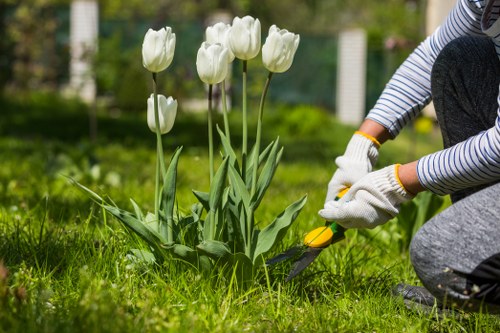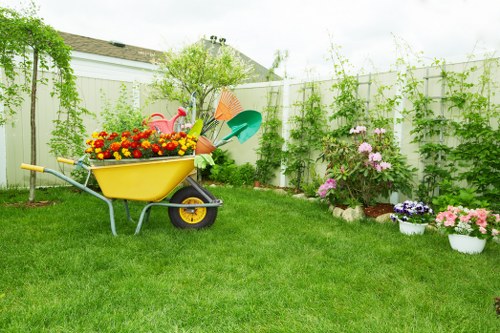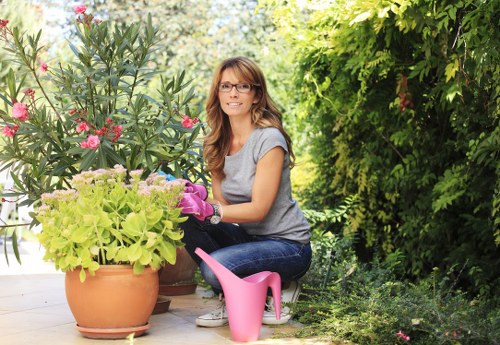Comprehensive Guide to Garden Maintenance in Sudbury

Introduction to Garden Maintenance
Maintaining a beautiful garden in Sudbury requires consistent care and attention. Whether you're a seasoned gardener or a beginner, understanding the specific needs of your garden can make all the difference. Garden maintenance in Sudbury involves various tasks, from soil preparation to seasonal planting, ensuring your outdoor space thrives throughout the year.
Sudbury's climate presents unique challenges and opportunities for gardeners. With cold winters and warm summers, it's essential to adopt strategies that protect your plants and promote healthy growth. Implementing effective garden maintenance practices will not only enhance the aesthetic appeal of your property but also contribute to a sustainable and eco-friendly environment.
In this guide, we'll explore the key aspects of garden maintenance in Sudbury, offering practical tips and insights to help you achieve a lush and vibrant garden.

Seasonal Garden Maintenance
Spring Maintenance
Spring is a critical time for garden maintenance in Sudbury. As the weather warms up, it's the perfect opportunity to prepare your garden for the growing season. Start by clearing away any debris left from the winter months, including fallen leaves and dead plant material. This cleanup helps prevent pests and diseases from taking hold.
Soil preparation is another essential task in spring. Test your soil's pH levels and nutrient content to determine if any amendments are needed. Adding compost or organic matter can improve soil structure, enhance drainage, and provide essential nutrients for your plants.
Additionally, spring is the ideal time to plant new flowers, vegetables, and shrubs. Selecting native plants that are well-suited to Sudbury's climate can increase their resilience and reduce maintenance needs.

Summer Maintenance
During the summer months, maintaining adequate moisture levels is crucial for garden health. Sudbury can experience warm and dry periods, so regular watering is necessary to prevent plant stress and wilting. Implementing an efficient irrigation system, such as drip irrigation, can ensure your plants receive consistent moisture without excessive water usage.
Weeding is another important summer maintenance task. Removing weeds promptly helps reduce competition for water and nutrients, allowing your garden plants to thrive. Mulching around plants can also suppress weed growth and help retain soil moisture.
Regularly monitoring for pests and diseases is vital in the summer. Inspect your plants for signs of infestations or infections and take appropriate measures, such as introducing natural predators or using organic pesticides, to manage issues before they escalate.

Fall Maintenance
As autumn approaches, fall garden maintenance in Sudbury focuses on preparing your garden for the upcoming winter. Start by harvesting any remaining vegetables and deadheading flowers to encourage new growth. Clearing away spent plants helps reduce the risk of pests overwintering in your garden.
Leaf removal is an essential task in the fall. While leaves can be composted and used to enrich your soil, a thick layer of fallen leaves can smother plants and inhibit growth. Raking and collecting leaves ensures your garden beds remain healthy and well-maintained.
Planting perennials and bulbs in the fall allows them to establish strong root systems before the cold winter months. This preparation leads to robust growth and blooming in the following spring.

Winter Maintenance
Winter may seem like a dormant period for your garden, but proper maintenance during this time can set the stage for a thriving garden come spring. Protect sensitive plants by applying mulch or covering them with frost blankets to insulate against freezing temperatures.
Pruning deciduous trees and shrubs in the winter helps maintain their shape and remove any dead or damaged branches. This not only improves the plant's overall health but also enhances its appearance.
Regularly inspect your garden structures, such as fences and trellises, for any damage caused by winter weather. Making necessary repairs ensures your garden remains secure and well-supported throughout the year.
Essential Garden Maintenance Practices
Successful garden maintenance in Sudbury hinges on several fundamental practices. Implementing these strategies will help maintain the health and beauty of your garden year-round.
Soil Health
Healthy soil is the foundation of a thriving garden. Regularly testing and amending your soil ensures it remains fertile and well-balanced. Incorporate organic matter, such as compost or well-rotted manure, to improve soil texture and nutrient content.
Mulching
Mulching serves multiple purposes in garden maintenance. It helps retain soil moisture, suppresses weed growth, and regulates soil temperature. Applying a layer of mulch around your plants can significantly reduce maintenance efforts and promote healthier growth.
Compost Utilization
Composting kitchen scraps and garden waste transforms them into valuable organic matter. Using compost in your garden enriches the soil, enhances microbial activity, and supports plant health. Establishing a composting system is a sustainable way to manage waste while boosting your garden's productivity.
Pruning and Trimming
Regular pruning and trimming are essential for maintaining the shape and health of your plants. Removing dead or diseased branches encourages new growth and prevents the spread of infections. Proper pruning techniques also enhance air circulation, reducing the likelihood of pest infestations.
When pruning, always use clean and sharp tools to make precise cuts. This minimizes damage to the plant and promotes faster healing. Understanding the specific pruning needs of different plant species will ensure optimal results.
In addition to trees and shrubs, regularly trimming hedges and maintaining garden borders keeps your garden looking well-kept and organized. Neatly trimmed plants contribute to the overall aesthetic appeal of your outdoor space.
Pest and Disease Management
Effective pest and disease management is crucial for garden maintenance in Sudbury. Regular monitoring allows you to identify issues early and take appropriate action. Implementing integrated pest management (IPM) strategies can help control pests naturally, reducing the need for chemical interventions.
Encouraging beneficial insects, such as ladybugs and lacewings, can naturally mitigate pest populations. Additionally, using organic pesticides and fungicides when necessary ensures your garden remains healthy without harming the environment.
Maintaining plant diversity in your garden can also deter pests. A varied garden environment disrupts pest life cycles and promotes a balanced ecosystem.
Watering Practices
Proper watering is a cornerstone of effective garden maintenance. Overwatering can lead to root rot and other plant diseases, while underwatering stresses plants and hampers growth. Finding the right balance is key to maintaining a healthy garden.
Installing an automated irrigation system can help ensure consistent watering, particularly during dry spells. Drip irrigation systems are particularly effective as they deliver water directly to the plant roots, minimizing evaporation and water waste.
Watering in the early morning hours reduces water loss due to evaporation and allows plants to absorb moisture before the heat of the day sets in. This practice promotes deeper root growth and more resilient plants.
Fertilization
Fertilizing your garden provides essential nutrients that support plant growth and productivity. Understanding your plants' specific nutrient needs allows you to apply the right type and amount of fertilizer. Over-fertilization can be as harmful as under-fertilization, leading to nutrient imbalances and environmental issues.
Organic fertilizers, such as compost and bone meal, release nutrients slowly and improve soil health over time. Synthetic fertilizers offer a quick nutrient boost but should be used sparingly to avoid potential negative impacts on soil and plant health.
Implementing a regular fertilization schedule tailored to your garden's needs ensures your plants receive the necessary nutrients throughout their growth cycles.
Choosing the Right Plants for Sudbury Gardens
Selecting appropriate plants is a critical component of garden maintenance in Sudbury. Choosing species that are well-suited to the local climate and soil conditions reduces maintenance efforts and increases the likelihood of successful growth.
Native Plants
Native plants are adapted to Sudbury's climate and soil, making them more resilient and easier to maintain. They typically require less water, fertilizers, and pesticides, contributing to a sustainable garden environment.
Perennials vs. Annuals
Understanding the difference between perennials and annuals helps in planning your garden layout and maintenance schedule. Perennials return year after year, providing long-term structure and stability, while annuals need to be replanted each season but offer vibrant, seasonal color.
Flowering Plants
Incorporating a mix of flowering plants ensures continuous blooms throughout the growing season. Choose varieties that thrive in Sudbury's climate, such as coneflowers, black-eyed Susans, and tulips, to add color and attract pollinators to your garden.
Vegetable Gardening
Vegetable gardens are a rewarding aspect of garden maintenance in Sudbury. Selecting vegetables that are suited to the local growing season and soil conditions increases your chances of a bountiful harvest.
Consider planting cool-season crops in early spring and late summer, such as lettuce, spinach, and peas. Warm-season vegetables like tomatoes, peppers, and cucumbers should be planted after the last frost date to ensure ample growing time.
Implementing crop rotation and companion planting strategies can enhance soil health and reduce pest issues in your vegetable garden.
Ornamental Gardens
Ornamental gardens focus on aesthetics, incorporating a variety of plants, structures, and decorative elements. Maintaining an ornamental garden involves regular pruning, deadheading, and pest management to keep plants healthy and visually appealing.
Incorporate garden structures like trellises, pergolas, and arbors to add vertical interest and support climbing plants. Decorative elements such as fountains, statues, and birdbaths enhance the overall ambiance of your garden space.
Regularly assessing and updating your garden design ensures it remains harmonious and reflects your personal style preferences.
Sustainable Gardening Practices
Embracing sustainable gardening practices contributes to the health of your garden and the environment. Implementing eco-friendly strategies minimizes resource use and promotes biodiversity.
Water Conservation
Conserving water is a significant aspect of sustainable garden maintenance. Utilize rain barrels to collect and store rainwater for garden use, reducing dependence on municipal water sources.
Composting
Composting organic waste not only reduces landfill contributions but also enriches your garden soil. Regularly adding compost improves soil structure, enhances nutrient content, and promotes beneficial microbial activity.
Integrated Pest Management (IPM)
IPM emphasizes using natural pest control methods over chemical solutions. By fostering a balanced ecosystem and encouraging beneficial insects, you can effectively manage pest populations without harming the environment.
Organic Gardening
Organic gardening avoids synthetic fertilizers and pesticides, focusing on natural methods to maintain plant health. Using organic amendments, such as compost and natural pest deterrents, creates a healthy growing environment and reduces environmental impact.
Choosing organic seeds and plant varieties ensures your garden remains free from genetically modified organisms (GMOs) and synthetic chemicals, promoting a healthier ecosystem.
Implementing organic gardening practices contributes to the longevity and sustainability of your garden, making it a rewarding and eco-friendly endeavor.
Wildlife-Friendly Gardens
Designing a wildlife-friendly garden supports local biodiversity and creates a vibrant ecosystem. Incorporate plants that attract beneficial insects, birds, and other wildlife to enhance your garden's health and beauty.
Providing habitats, such as birdhouses, insect hotels, and water sources, encourages a variety of species to thrive in your garden. This natural balance helps manage pest populations and promotes pollination.
A wildlife-friendly garden not only benefits the environment but also adds dynamic and lively elements to your outdoor space, making it more enjoyable and engaging.
Tools and Equipment for Garden Maintenance
Having the right tools and equipment is essential for effective garden maintenance. Investing in quality tools enhances your efficiency and ensures tasks are performed correctly, promoting the health and longevity of your garden.
Essential Tools
- Pruning shears for precise cutting
- Garden gloves to protect your hands
- Spades and shovels for digging and soil preparation
- Rakes for clearing debris and leveling soil
- Watering cans or hoses with adjustable nozzles
- Loppers for trimming thicker branches
- Wheelbarrows for transporting materials
Regularly maintaining your tools by cleaning and sharpening ensures they remain effective and safe to use.
Advanced Equipment
For larger gardens, consider investing in advanced equipment such as lawn mowers, tillers, and hedge trimmers. These tools can significantly reduce the time and effort required for maintenance tasks.
Smart Irrigation Systems
Installing smart irrigation systems allows for precise water management. These systems can be programmed to deliver the right amount of water at optimal times, conserving resources and promoting healthy plant growth.
Storage Solutions
Organizing and storing your garden tools and equipment properly extends their lifespan and keeps your garden area tidy. Utilize sheds, tool racks, and storage bins to keep everything in order and easily accessible.
Labeling storage areas and regularly decluttering helps maintain an efficient workspace, making garden maintenance tasks smoother and more enjoyable.
Hiring Professional Garden Maintenance Services in Sudbury
While DIY garden maintenance is rewarding, hiring professional garden maintenance services in Sudbury can provide expertise and save you time. Professionals offer comprehensive care, from landscape design to ongoing maintenance, ensuring your garden remains pristine and healthy.
Benefits of Professional Services
- Expert knowledge of local plant species and climate
- Efficient handling of complex maintenance tasks
- Customized garden care plans tailored to your needs
- Access to specialized tools and equipment
- Consistent and reliable maintenance schedules
Engaging professionals allows you to enjoy a beautiful garden without the stress of daily upkeep, providing peace of mind and a stunning outdoor space year-round.
Choosing the Right Service
When selecting a garden maintenance service in Sudbury, consider factors such as experience, reputation, and the range of services offered. Reading reviews and asking for recommendations can help you find a reliable and skilled provider.
Cost Considerations
While hiring professionals involves an investment, the benefits often outweigh the costs. Compare quotes and service packages to find a solution that fits your budget and meets your garden's specific needs.
Customized Maintenance Plans
Professional garden maintenance services often offer customized plans tailored to your garden's unique requirements. Whether you need regular mowing, seasonal planting, or specialized pruning, a personalized plan ensures all aspects of your garden are well-maintained.
Discuss your preferences and goals with your service provider to create a maintenance schedule that aligns with your vision and maximizes your garden's potential.
Ongoing Support and Consultation
Professional services typically provide ongoing support and consultation, offering expert advice on plant care, garden design, and sustainable practices. This guidance helps you make informed decisions and enhances your gardening knowledge.
Regular consultations ensure that your garden evolves with the changing seasons and adapts to any new challenges, maintaining its beauty and vitality year after year.
Conclusion
Effective garden maintenance in Sudbury involves a blend of seasonal care, essential practices, and sustainable strategies. By understanding your garden's unique needs and implementing these comprehensive maintenance techniques, you can cultivate a thriving and beautiful outdoor space.
Whether you choose to maintain your garden independently or enlist professional services, dedicating time and effort to garden maintenance ensures long-term success and enjoyment.
Start implementing these garden maintenance tips today and transform your Sudbury garden into a lush, vibrant sanctuary.
Contact us today to learn more about our garden maintenance services and take the first step toward a beautiful and sustainable garden.

